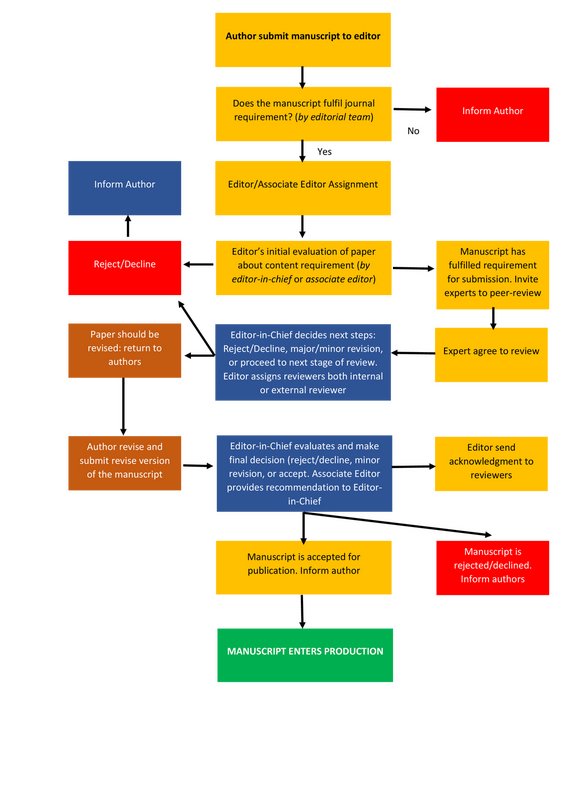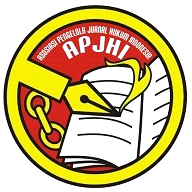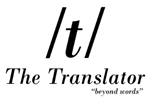- Focus and Scope
- Section Policies
- Peer Review Process
- Publication Frequency
- Open Access Policy
- Retraction Policy
- Publication Ethics
- Plagiarism Policy
- Articles Processing Charges (APCs)
- Indexing And Abstracting
Focus and Scope
Additionally, the journal explores the complexities of legal pluralism, focusing on how different legal traditions such as customary law, religious law, and state law interact and contribute to social justice, governance, and legal equality. Studies on constitutional law, administrative law, and the role of legal institutions in safeguarding democratic values and ensuring accountability are also central to the journal's mission. Contributions examining the impact of international law, human rights treaties, and global governance structures on justice and conflict resolution are welcomed. Jurnal Legalitas also seeks to address the challenges and opportunities posed by the digital age, with a focus on telematics law, the role of technology in legal processes, and the ethical dilemmas surrounding AI and digital justice. Through its comprehensive and interdisciplinary approach, the journal aims to provide critical insights and foster meaningful discourse on the development of law in an increasingly interconnected world.
Section Policies
Artikel
Peer Review Process
Peer Review Process
Detailed information about the flow of the manuscript submission to the acceptance by the editor is shown in the following figure:

The final decision of manuscript acceptance is made by Editor in Chief (together with Editorial Board if required) according to reviewers' critical comments. Jurnal Legalitas has five types of decisions:
- Accepted. The journal will publish the paper in its original form;
- Accepted by Minor Revisions, the journal will publish the paper and asks the author to make small corrections (let authors revise with stipulated time);
- Accepted by Major Revisions, the journal will publish the paper provided the authors make the changes suggested by the reviewers and/or editors (let authors revised with stipulated time);
- Resubmit (conditional rejection), the journal is willing to reconsider the paper in another round of decision-making after the authors make major changes;
- Rejected / Decline (outright rejection), the journal will not publish the paper or reconsider it even if the authors make major revisions. Generally, on grounds of the outside of focus and scope, major technical description problems, lack of clarity of presentation.
Publication Frequency
Jurnal Legalitas (J. Legalitas - JELTA) is a journal published by Faculty of Law Universitas Negeri Gorontalo, Biannual in April and October
Open Access Policy
This journal provides immediate open access to its content on the principle that making research freely available to the public supports a greater global exchange of knowledge.
Retraction Policy
Jelta's policy
Basically, journal editors can not independently be deciding which articles shall be published. In making decisions regarding publishing, editors are guided by the policies of the journal's editorial board and are limited by applicable legal requirements relating to defamation, copyright infringement, double publishing, and plagiarism. Articles that have been published will remain extant, exact and unaltered as far as is possible. However, under certain circumstances can arise where articles that have been published must then be withdrawn or even deleted. Such actions should not be carried out except in exceptional circumstances.
A retraction of articles that have been published can be initiated by journal editors, authors and/or their institutions. In certain cases, the retraction must be accompanied by an apology for the previous mistakes and/or expressions of gratitude to those who revealed the error to the author. A retraction of published scientific articles must be accompanied by a statement that the original article must not be published and that data and conclusions should not be used as part of the basis for future research.
Article withdrawal
These circumstances can occur if the initial version of the article contains an error, or may have been accidentally sent twice to both Jelta and/or a different publisher. In addition, it can also occur due to an element of Infringements of the scientific code of ethics, such as double submissions, false claims of authorship, plagiarism, self-plagiarism, fraudulent use of data or the like. Articles that meet the element of Infringements of the code of ethics upon the awareness of the author can make a withdrawal of his article accompanied by a letter of statement withdrawal addressed to the editorial board of Jelta.
Article retraction
A retraction is carried out if an article is indicated to have an Infringement of scientific ethical codes, such as double submissions, false claims of authorship, plagiarism, self-morningism, fraudulent use of data, fake authors or the like. Also, a retraction will be used to correct errors in submission or publication. A retraction of an article by the author or editor under the advice of the editorial board of the Jelta. There are several forms of retraction carried out by Jelta, i.e.:
- If the infringements of the scientific code of ethics are indicated before the article is published, the editor will return the manuscript to the author accompanied by a retraction letter from the Editor in Chief;
- If the infringements of the scientific code of ethics are indicated after the article is published, there are several mechanisms that can occur:
- A retraction note titled “Retraction: [article title]” signed by the authors and/or the editor is published in the paginated part of a subsequent issue of the journal and listed in the contents list.
- The online article is preceded by a screen containing the retraction note. It is to this screen that the link resolves; the reader can then proceed to the article itself.
- The original article is retained unchanged save for a watermark on the .pdf indicating on each page that it is “retracted.”
- The HTML version of the document is removed.
Article removal: legal limitations
In cases where the article, if acted upon, might pose a serious health risk, the authors of the original article may wish to retract the flawed original and replace it with a corrected version. In these circumstances, the procedures for retraction will be followed with the difference that the database retraction notice will publish a link to the corrected re-published article and a history of the document
Publication Ethics
Jurnal Legalitas (J. Legalitas. - JELTA) is a peer-reviewed journal published by Faculty of Law Universitas Negeri Gorontalo. The journal is committed to upholding the highest standards of publication ethics and takes all possible measures against any publication malpractices. All authors submitting their works to the journal for publication as original articles attest that the submitted works represent their authors’ contributions and have not been copied or plagiarized in whole or in part from other works. This statement is based on Elsevier's Policies and Ethics and COPE Best Practice Guidelines for Journal Editors.
Duties of Authors
- Reporting Standards: Authors of reports or original research should present an accurate account of the work performed as well as an objective discussion of its significance. Underlying data should be represented accurately in the paper. A paper should contain sufficient detail and references to permit others to replicate the work. Fraudulent or knowingly inaccurate statements constitute unethical behaviour and are unacceptable.
- Data Access and Retention: Authors are asked to provide the raw data in connection with a paper for editorial review, and should be prepared to provide public access to such data (consistent with the ALPSP-STM Statement on Data and Databases), if practicable, and should, in any event, be prepared to retain such data for a reasonable time after publication.
- Originality and Plagiarism: The authors should ensure that they have written entirely original works. If the authors have used the work and/or words of others then it has to be appropriately cited or quoted. Plagiarism takes many forms, from 'passing off' another's paper as the author's own paper, to copying or paraphrasing substantial parts of another's paper (without attribution), and/or to claiming results from research conducted by others. Plagiarism in all its forms constitutes unethical publishing behaviour and is unacceptable.
- Multiple, Redundant or Concurrent Publication: An author should not, in general, publish manuscripts describing essentially the same research in more than one journal or primary publication. Submitting the same manuscript to more than one journal concurrently constitutes unethical publishing behaviour and is unacceptable.
- Acknowledgement of Sources: Proper acknowledgment of the work of others must always be given. Authors should cite publications that have been influential in determining the nature of the reported work.
- Authorship of the Paper: Authorship should be limited to those who have made a significant contribution to the conception, design, execution, or interpretation of the reported study. All those who have made significant contributions should be listed as co-authors. Where there are others who have participated in certain substantive aspects of the research project, they should be acknowledged or listed as contributors. The corresponding author should ensure that all appropriate co-authors and no inappropriate co-authors are included on the paper and that all co-authors have seen and approved the final version of the paper and have agreed to its submission for publication.
- Disclosure and Conflicts of Interest: All authors should disclose in their manuscript any financial or other substantive conflicts of interest that might be construed to influence the results or interpretation of their manuscript. All sources of financial support for the project should be disclosed.
- Fundamental Errors in Published Works: When an author discovers a significant error or inaccuracy in his/her own published work, it is the author’s obligation to promptly notify the journal editor or publisher and cooperate with the editor to retract or correct the paper.
- Hazards and Human or Animal Subjects: If the work involves chemicals, procedures or equipment that have any unusual hazards inherent in their use, the author must clearly identify these in the manuscript.
Duties of Editors
- Fair Play: An editor at any time evaluates manuscripts for their intellectual content without regard to race, gender, sexual orientation, religious belief, ethnic origin, citizenship, or political philosophy of the authors.
- Confidentiality: The editor and any editorial staff must not disclose any information about a submitted manuscript to anyone other than the corresponding author, reviewers, potential reviewers, other editorial advisers, and the publisher, as appropriate.
- Disclosure and Conflicts of Interest: Unpublished materials disclosed in a submitted manuscript must not be used in an editor's own research without the express written consent of the author.
- Publication Decisions: The editor board journal are responsible for deciding which of the articles submitted to the journal should be published. The validation of the work in question and its importance to researchers and readers must always drive such decisions. The editors may be guided by the policies of the journal's editorial board and constrained by such legal requirements as shall then be in force regarding libel, copyright infringement, and plagiarism. The editors may confer with other editors or reviewers in making this decision.
- Review of Manuscripts: The editor must ensure that each manuscript is initially evaluated by the editor for originality. The editor should organize and use peer review fairly and wisely. Editors should explain their peer review processes in the information for authors and also indicate which parts of the journal are peer-reviewed. The editor should use appropriate peer reviewers for papers that are considered for publication by selecting people with sufficient expertise and avoiding those with conflicts of interest.
Duties of Reviewers
- Contribution to Editorial Decisions: Peer review assists the editor in making editorial decisions and through the editorial communications with the author may also assist the author in improving the paper.
- Promptness: Any selected referee who feels unqualified to review the research reported in a manuscript or knows that its prompt review will be impossible should notify the editor and excuse himself from the review process.
- Standards of Objectivity: Reviews should be conducted objectively. Personal criticism of the author is inappropriate. Referees should express their views clearly with supporting arguments.
- Confidentiality: Any manuscripts received for review must be treated as confidential documents. They must not be shown to or discussed with others except as authorized by the editor.
- Disclosure and Conflict of Interest: Privileged information or ideas obtained through peer review must be kept confidential and not used for personal advantage. Reviewers should not consider manuscripts in which they have conflicts of interest resulting from competitive, collaborative, or other relationships or connections with any of the authors, companies, or institutions connected to the papers.
- Acknowledgement of Sources: Reviewers should identify relevant published work that has not been cited by the authors. Any statement that an observation, derivation, or argument had been previously reported should be accompanied by the relevant citation. A reviewer should also call to the editor's attention any substantial similarity or overlap between the manuscript under consideration and any other published paper of which they have personal knowledge.
Plagiarism Policy
Articles Processing Charges (APCs)
Jurnal Legalitas (JELTA) welcomes article submissions and charge Articles Processing Charges (APCs)
- Article Submission: 0.00 (IDR)Article Submission Charges FREE
- Article Publication Charges : 1.000.000 (IDR)If this paper is accepted for publication, you will be asked to pay an Article Publication Fee to cover publication costs.
- Access/download Articles : 0.00 (IDR)Libraries/Individuals can read and download any full-text articles (online version) for FREE
Indexing And Abstracting
Jurnal Legalitas (J. Legalitas - JELTA) has been covered by the following indexing site:



.png)







_logo2.png)



